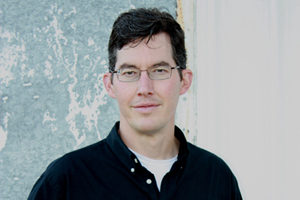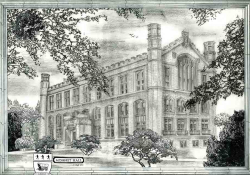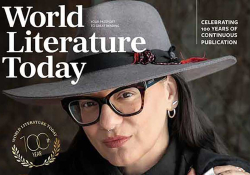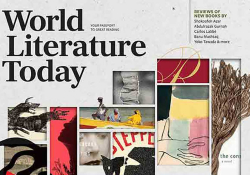Editor's Note, January 2013

Think of consciousness as a territory just opening to settlement and exploitation, something like an Oklahoma land rush. Put it in color, set it to music, frame it in images. . . . – Saul Bellow, Collected Stories (2001)
Since the late 1960s, when WLT convened the jury for the first Neustadt International Prize for Literature and launched the Puterbaugh Conferences on World Literature, hundreds of writers have visited the University of Oklahoma campus as laureates, jurors, or Puterbaugh fellows. For longtime editor Ivar Ivask, who brainstormed both initiatives, bringing internationally renowned writers to OU meshed perfectly with the journal’s mission, dating back to its founding as Books Abroad in 1927: “Books Abroad was invented by a scholar of vision from landlocked Nebraska, Roy Temple House. He devised as the journal’s logo a full-rigged ship with the motto Lux a peregre, ‘Light from abroad.’ He obviously thought of books as ships, filled with light from abroad, reaching the inland harbor of his journal. It is a rather poetic but nonetheless apt image. However, the image of the generous harbor must be coupled with that of a lighthouse which radiates the light received back abroad, since this has also been an essential function of the quarterly” (Books Abroad, Winter 1976).
For the many writers who have arrived at the “inland harbor” of Oklahoma over the years, their expectations, prior to arrival, were often shaped by the mythical territory so often depicted in movies, musicals, and novels—from Cimarron to Oklahoma! and The Grapes of Wrath—more so than by the actual land itself and its present-day inhabitants. Early visitors to the southern plains, from Coronado to Washington Irving, marveled over the physical landscape, while writers from Twain to Kafka imagined it as terra incognita, a westering trope representing freedom, escape from authority. When Huck Finn famously lights out for the territory, no doubt he heads toward Indian Territory, which was eventually yoked to Oklahoma Territory to create the state of Oklahoma in 1907.
For Indian-Canadian writer Rohinton Mistry, the 2012 Neustadt Prize laureate whose work is celebrated in this issue (see page 44), the American West—indeed, the very name “Oklahoma”—seized his imagination as a boy growing up in Bombay. In his acceptance speech during the Neustadt banquet last September, Mistry invoked Rodgers and Hammerstein and Woody Guthrie but also Bury My Heart at Wounded Knee, Dee Brown’s chronicle of the systematic displacement of Native Americans in US history, which Mistry characterized as “perhaps the most tragic chapters in American history,” akin to the “infiltration, occupation, and conquest” that generations of Indians experienced under British colonial rule. Modern India, like the United States, remains haunted by its colonial past, Mistry writes: “These were the generations who had borrowed, or borrowed from, the culture of the colonizer, that imperial lender who had made the loan seem a gift: seductive, pain-free, tantalizing. And, in time, the borrowers came to believe it was their birthright, their own culture, . . . vastly superior to the native one which had been quietly expunged from their lives.” For those generations of Native Americans force-marched to Indian Territory or coerced into attending the infamous boarding schools, such a scenario must sound all too familiar.
As a boy Mistry dreamed of a career as a singing cowboy on an unfenced prairie filled with “bright golden haze on the meadow” and the earth itself rising up in song, but by the time he left India in 1975 during the Emergency, his musical tastes had turned to Bob Dylan, Pink Floyd, and Joni Mitchell. And while Mistry’s journey to North America might have inspired him to write about an odyssey to the West that is at the heart of so much great literature, he chose instead to write about “the space between” the home he left behind and the one to which he could never return, where a new habitation “could be built, anew, with memory and imagination, scaffolded by language.” As the latest writer to translate an original homeland into an imagined one, Mistry confirms that every conquest begins with—and returns to—language.









